A Report on Academic Integrity, Game Creation and Skill Development
VerifiedAdded on 2023/06/09
|9
|2605
|260
Report
AI Summary
This report is divided into two sections. The first section defines academic integrity and its importance in higher education, considering the ramifications of scholastic dishonesty. It emphasizes the principles of academic honesty, including truthfulness, objectivity, and accountability. The second section reflects on the processes and challenges faced while creating a game for Assignment 2, detailing the skills acquired during the scholastic term, such as improved writing, research, and critical thinking abilities. The report highlights the practical application of these skills in game design, emphasizing the importance of citing sources and avoiding plagiarism. The author reflects on personal growth, including improved time management and goal-setting, demonstrating a commitment to academic excellence and professional development.
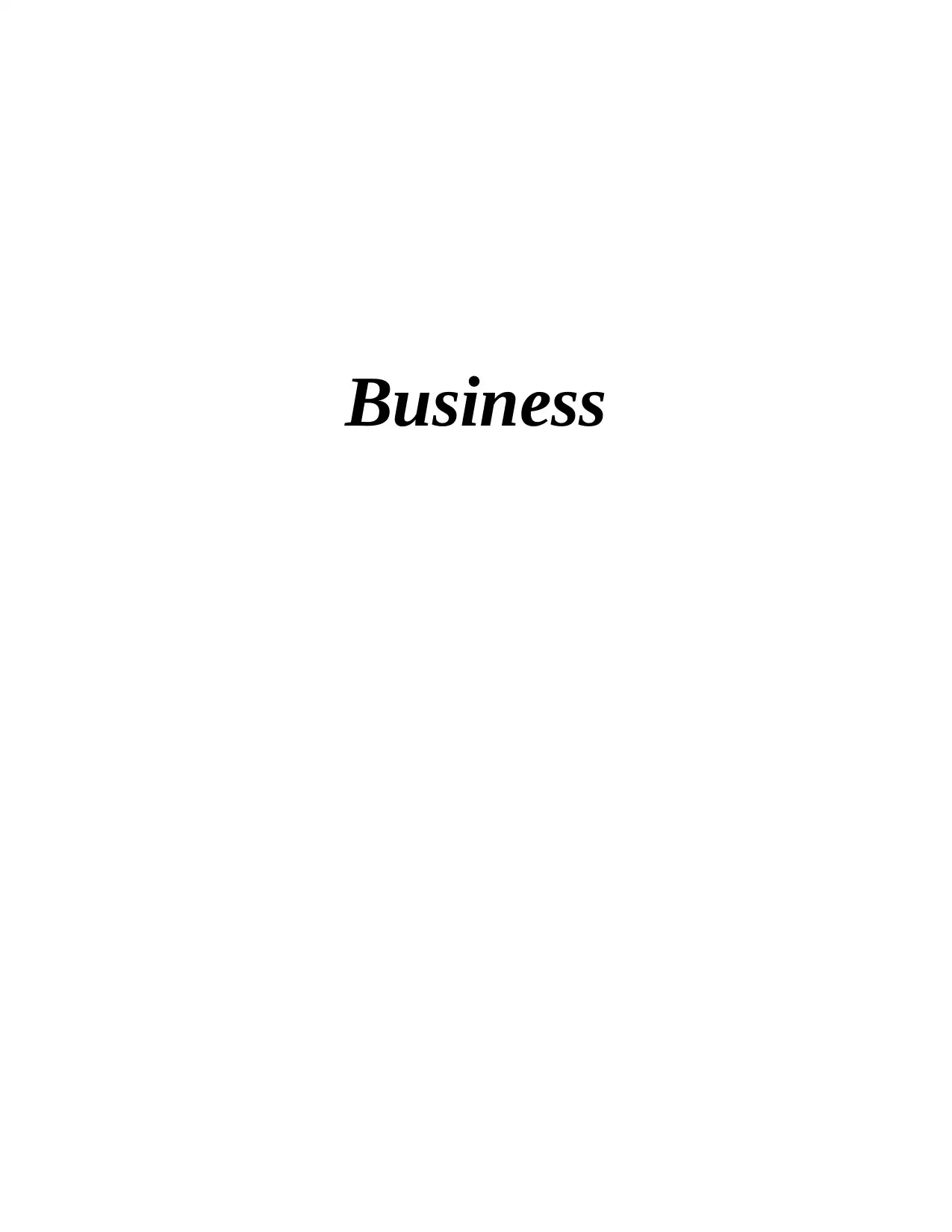
Business
Paraphrase This Document
Need a fresh take? Get an instant paraphrase of this document with our AI Paraphraser
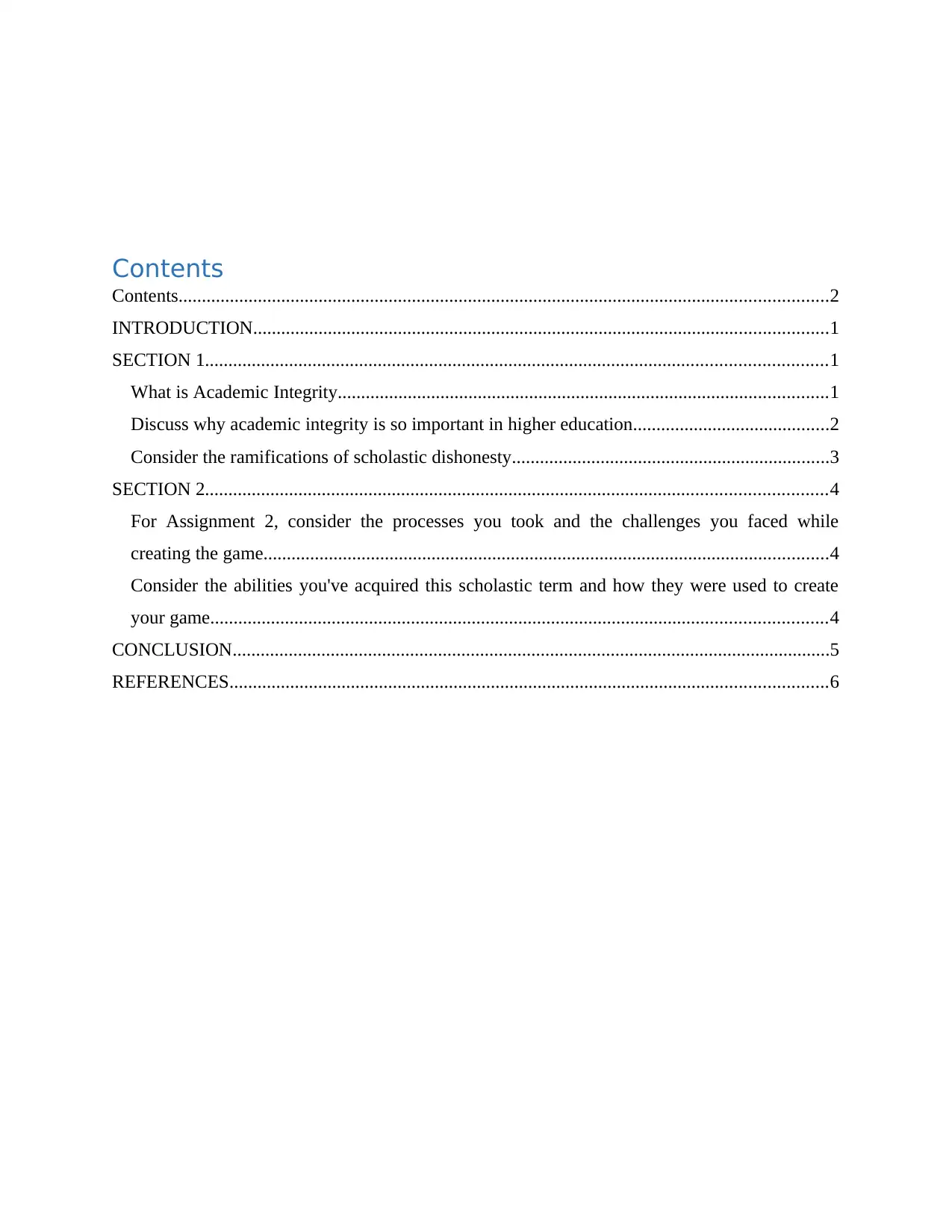
Contents
Contents...........................................................................................................................................2
INTRODUCTION...........................................................................................................................1
SECTION 1.....................................................................................................................................1
What is Academic Integrity.........................................................................................................1
Discuss why academic integrity is so important in higher education..........................................2
Consider the ramifications of scholastic dishonesty....................................................................3
SECTION 2.....................................................................................................................................4
For Assignment 2, consider the processes you took and the challenges you faced while
creating the game.........................................................................................................................4
Consider the abilities you've acquired this scholastic term and how they were used to create
your game....................................................................................................................................4
CONCLUSION................................................................................................................................5
REFERENCES................................................................................................................................6
Contents...........................................................................................................................................2
INTRODUCTION...........................................................................................................................1
SECTION 1.....................................................................................................................................1
What is Academic Integrity.........................................................................................................1
Discuss why academic integrity is so important in higher education..........................................2
Consider the ramifications of scholastic dishonesty....................................................................3
SECTION 2.....................................................................................................................................4
For Assignment 2, consider the processes you took and the challenges you faced while
creating the game.........................................................................................................................4
Consider the abilities you've acquired this scholastic term and how they were used to create
your game....................................................................................................................................4
CONCLUSION................................................................................................................................5
REFERENCES................................................................................................................................6
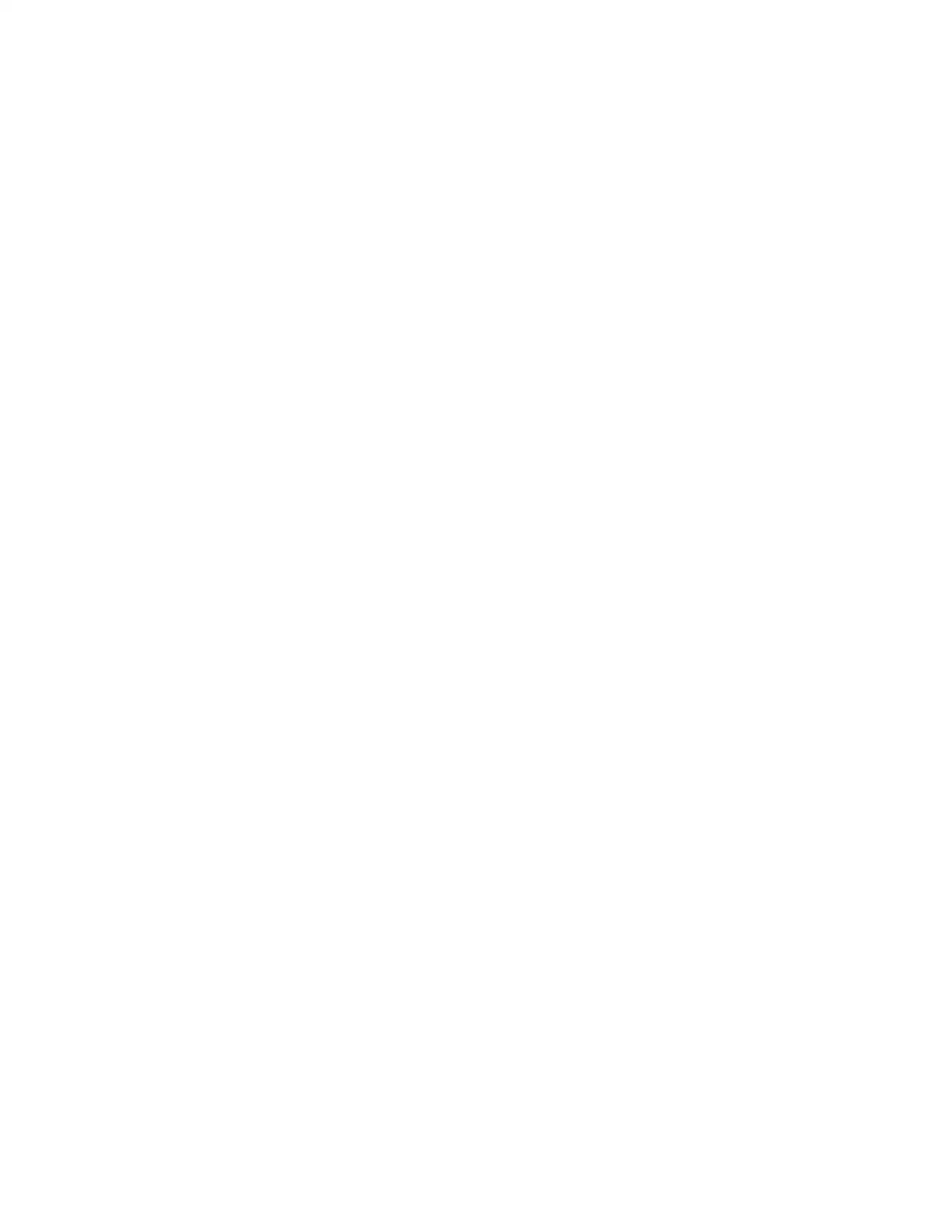
⊘ This is a preview!⊘
Do you want full access?
Subscribe today to unlock all pages.

Trusted by 1+ million students worldwide
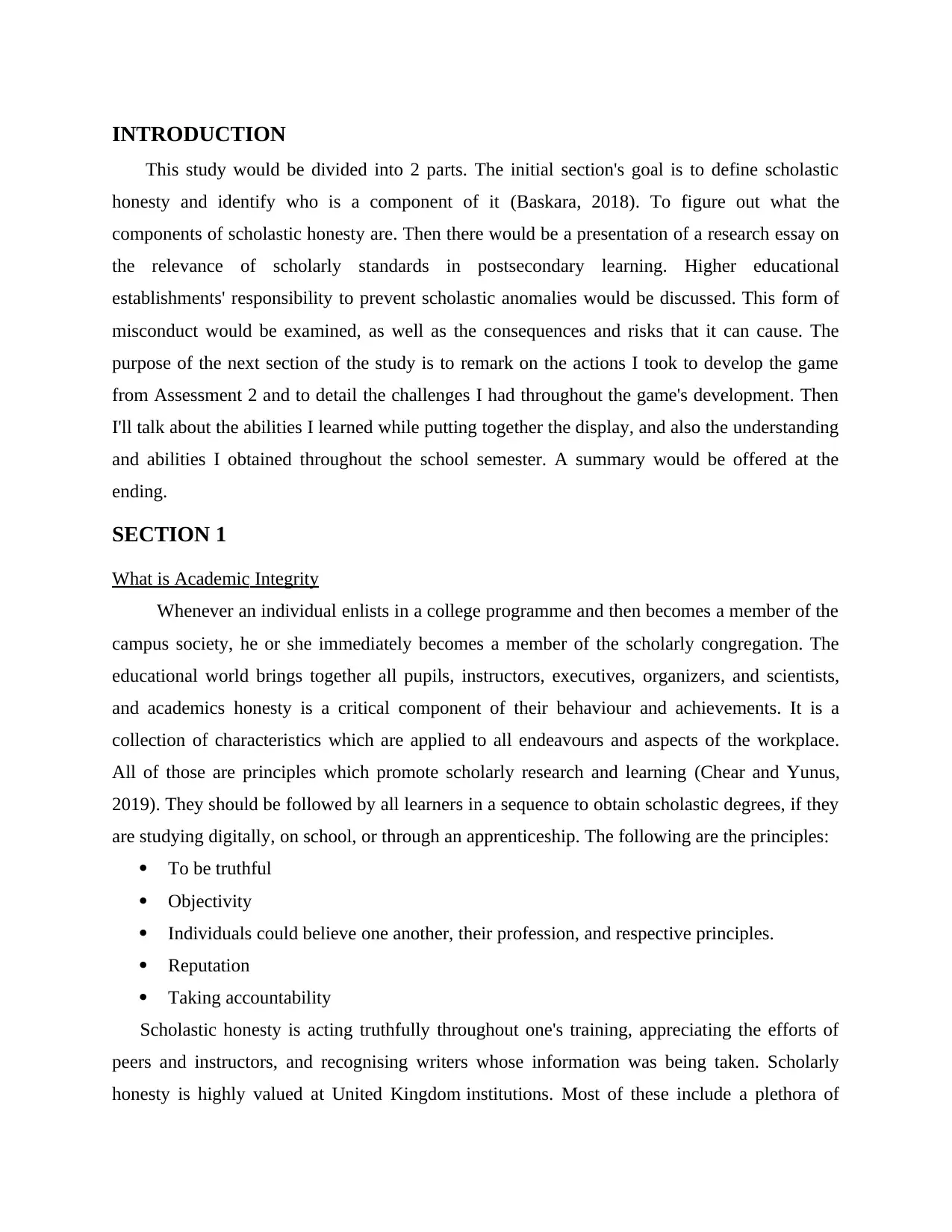
INTRODUCTION
This study would be divided into 2 parts. The initial section's goal is to define scholastic
honesty and identify who is a component of it (Baskara, 2018). To figure out what the
components of scholastic honesty are. Then there would be a presentation of a research essay on
the relevance of scholarly standards in postsecondary learning. Higher educational
establishments' responsibility to prevent scholastic anomalies would be discussed. This form of
misconduct would be examined, as well as the consequences and risks that it can cause. The
purpose of the next section of the study is to remark on the actions I took to develop the game
from Assessment 2 and to detail the challenges I had throughout the game's development. Then
I'll talk about the abilities I learned while putting together the display, and also the understanding
and abilities I obtained throughout the school semester. A summary would be offered at the
ending.
SECTION 1
What is Academic Integrity
Whenever an individual enlists in a college programme and then becomes a member of the
campus society, he or she immediately becomes a member of the scholarly congregation. The
educational world brings together all pupils, instructors, executives, organizers, and scientists,
and academics honesty is a critical component of their behaviour and achievements. It is a
collection of characteristics which are applied to all endeavours and aspects of the workplace.
All of those are principles which promote scholarly research and learning (Chear and Yunus,
2019). They should be followed by all learners in a sequence to obtain scholastic degrees, if they
are studying digitally, on school, or through an apprenticeship. The following are the principles:
To be truthful
Objectivity
Individuals could believe one another, their profession, and respective principles.
Reputation
Taking accountability
Scholastic honesty is acting truthfully throughout one's training, appreciating the efforts of
peers and instructors, and recognising writers whose information was being taken. Scholarly
honesty is highly valued at United Kingdom institutions. Most of these include a plethora of
This study would be divided into 2 parts. The initial section's goal is to define scholastic
honesty and identify who is a component of it (Baskara, 2018). To figure out what the
components of scholastic honesty are. Then there would be a presentation of a research essay on
the relevance of scholarly standards in postsecondary learning. Higher educational
establishments' responsibility to prevent scholastic anomalies would be discussed. This form of
misconduct would be examined, as well as the consequences and risks that it can cause. The
purpose of the next section of the study is to remark on the actions I took to develop the game
from Assessment 2 and to detail the challenges I had throughout the game's development. Then
I'll talk about the abilities I learned while putting together the display, and also the understanding
and abilities I obtained throughout the school semester. A summary would be offered at the
ending.
SECTION 1
What is Academic Integrity
Whenever an individual enlists in a college programme and then becomes a member of the
campus society, he or she immediately becomes a member of the scholarly congregation. The
educational world brings together all pupils, instructors, executives, organizers, and scientists,
and academics honesty is a critical component of their behaviour and achievements. It is a
collection of characteristics which are applied to all endeavours and aspects of the workplace.
All of those are principles which promote scholarly research and learning (Chear and Yunus,
2019). They should be followed by all learners in a sequence to obtain scholastic degrees, if they
are studying digitally, on school, or through an apprenticeship. The following are the principles:
To be truthful
Objectivity
Individuals could believe one another, their profession, and respective principles.
Reputation
Taking accountability
Scholastic honesty is acting truthfully throughout one's training, appreciating the efforts of
peers and instructors, and recognising writers whose information was being taken. Scholarly
honesty is highly valued at United Kingdom institutions. Most of these include a plethora of
Paraphrase This Document
Need a fresh take? Get an instant paraphrase of this document with our AI Paraphraser
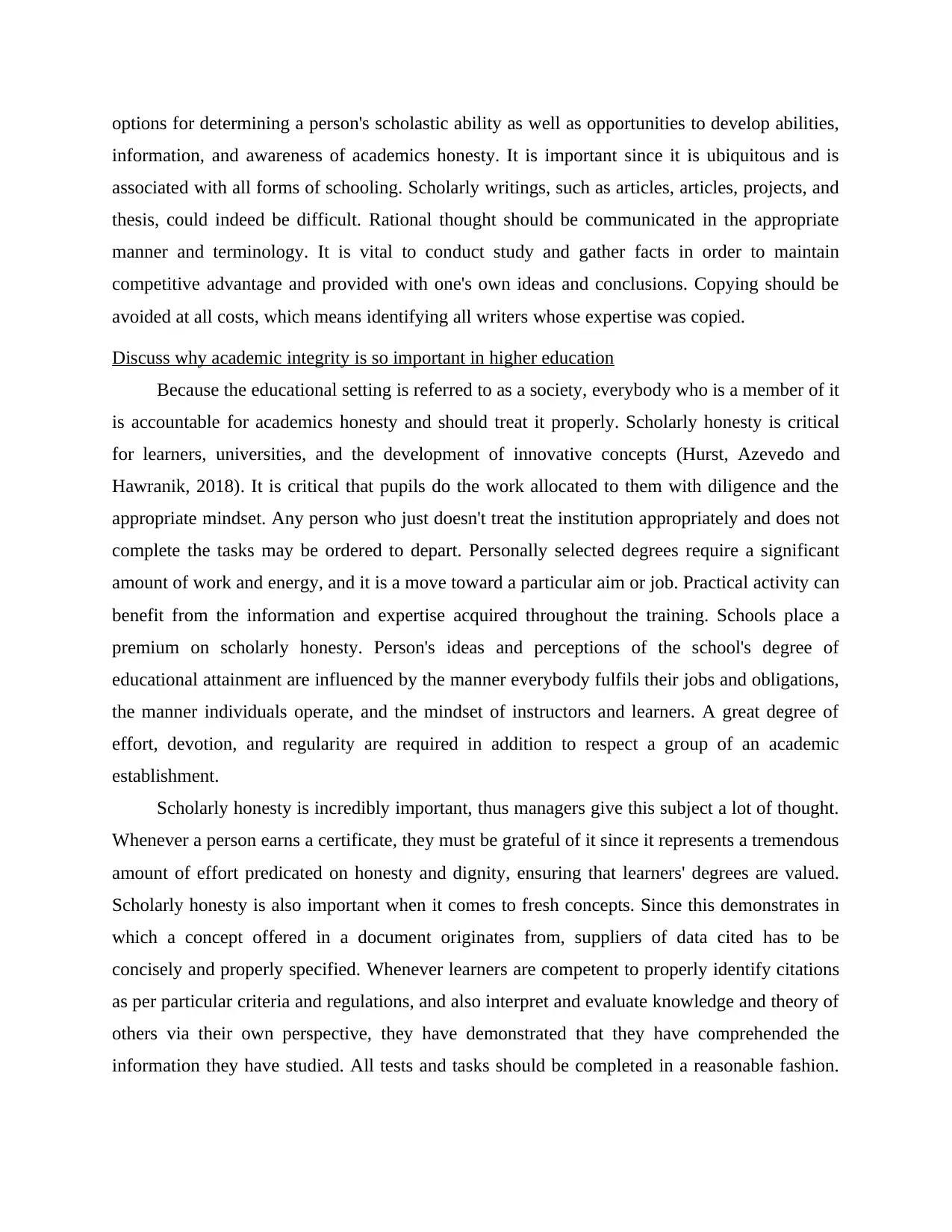
options for determining a person's scholastic ability as well as opportunities to develop abilities,
information, and awareness of academics honesty. It is important since it is ubiquitous and is
associated with all forms of schooling. Scholarly writings, such as articles, articles, projects, and
thesis, could indeed be difficult. Rational thought should be communicated in the appropriate
manner and terminology. It is vital to conduct study and gather facts in order to maintain
competitive advantage and provided with one's own ideas and conclusions. Copying should be
avoided at all costs, which means identifying all writers whose expertise was copied.
Discuss why academic integrity is so important in higher education
Because the educational setting is referred to as a society, everybody who is a member of it
is accountable for academics honesty and should treat it properly. Scholarly honesty is critical
for learners, universities, and the development of innovative concepts (Hurst, Azevedo and
Hawranik, 2018). It is critical that pupils do the work allocated to them with diligence and the
appropriate mindset. Any person who just doesn't treat the institution appropriately and does not
complete the tasks may be ordered to depart. Personally selected degrees require a significant
amount of work and energy, and it is a move toward a particular aim or job. Practical activity can
benefit from the information and expertise acquired throughout the training. Schools place a
premium on scholarly honesty. Person's ideas and perceptions of the school's degree of
educational attainment are influenced by the manner everybody fulfils their jobs and obligations,
the manner individuals operate, and the mindset of instructors and learners. A great degree of
effort, devotion, and regularity are required in addition to respect a group of an academic
establishment.
Scholarly honesty is incredibly important, thus managers give this subject a lot of thought.
Whenever a person earns a certificate, they must be grateful of it since it represents a tremendous
amount of effort predicated on honesty and dignity, ensuring that learners' degrees are valued.
Scholarly honesty is also important when it comes to fresh concepts. Since this demonstrates in
which a concept offered in a document originates from, suppliers of data cited has to be
concisely and properly specified. Whenever learners are competent to properly identify citations
as per particular criteria and regulations, and also interpret and evaluate knowledge and theory of
others via their own perspective, they have demonstrated that they have comprehended the
information they have studied. All tests and tasks should be completed in a reasonable fashion.
information, and awareness of academics honesty. It is important since it is ubiquitous and is
associated with all forms of schooling. Scholarly writings, such as articles, articles, projects, and
thesis, could indeed be difficult. Rational thought should be communicated in the appropriate
manner and terminology. It is vital to conduct study and gather facts in order to maintain
competitive advantage and provided with one's own ideas and conclusions. Copying should be
avoided at all costs, which means identifying all writers whose expertise was copied.
Discuss why academic integrity is so important in higher education
Because the educational setting is referred to as a society, everybody who is a member of it
is accountable for academics honesty and should treat it properly. Scholarly honesty is critical
for learners, universities, and the development of innovative concepts (Hurst, Azevedo and
Hawranik, 2018). It is critical that pupils do the work allocated to them with diligence and the
appropriate mindset. Any person who just doesn't treat the institution appropriately and does not
complete the tasks may be ordered to depart. Personally selected degrees require a significant
amount of work and energy, and it is a move toward a particular aim or job. Practical activity can
benefit from the information and expertise acquired throughout the training. Schools place a
premium on scholarly honesty. Person's ideas and perceptions of the school's degree of
educational attainment are influenced by the manner everybody fulfils their jobs and obligations,
the manner individuals operate, and the mindset of instructors and learners. A great degree of
effort, devotion, and regularity are required in addition to respect a group of an academic
establishment.
Scholarly honesty is incredibly important, thus managers give this subject a lot of thought.
Whenever a person earns a certificate, they must be grateful of it since it represents a tremendous
amount of effort predicated on honesty and dignity, ensuring that learners' degrees are valued.
Scholarly honesty is also important when it comes to fresh concepts. Since this demonstrates in
which a concept offered in a document originates from, suppliers of data cited has to be
concisely and properly specified. Whenever learners are competent to properly identify citations
as per particular criteria and regulations, and also interpret and evaluate knowledge and theory of
others via their own perspective, they have demonstrated that they have comprehended the
information they have studied. All tests and tasks should be completed in a reasonable fashion.
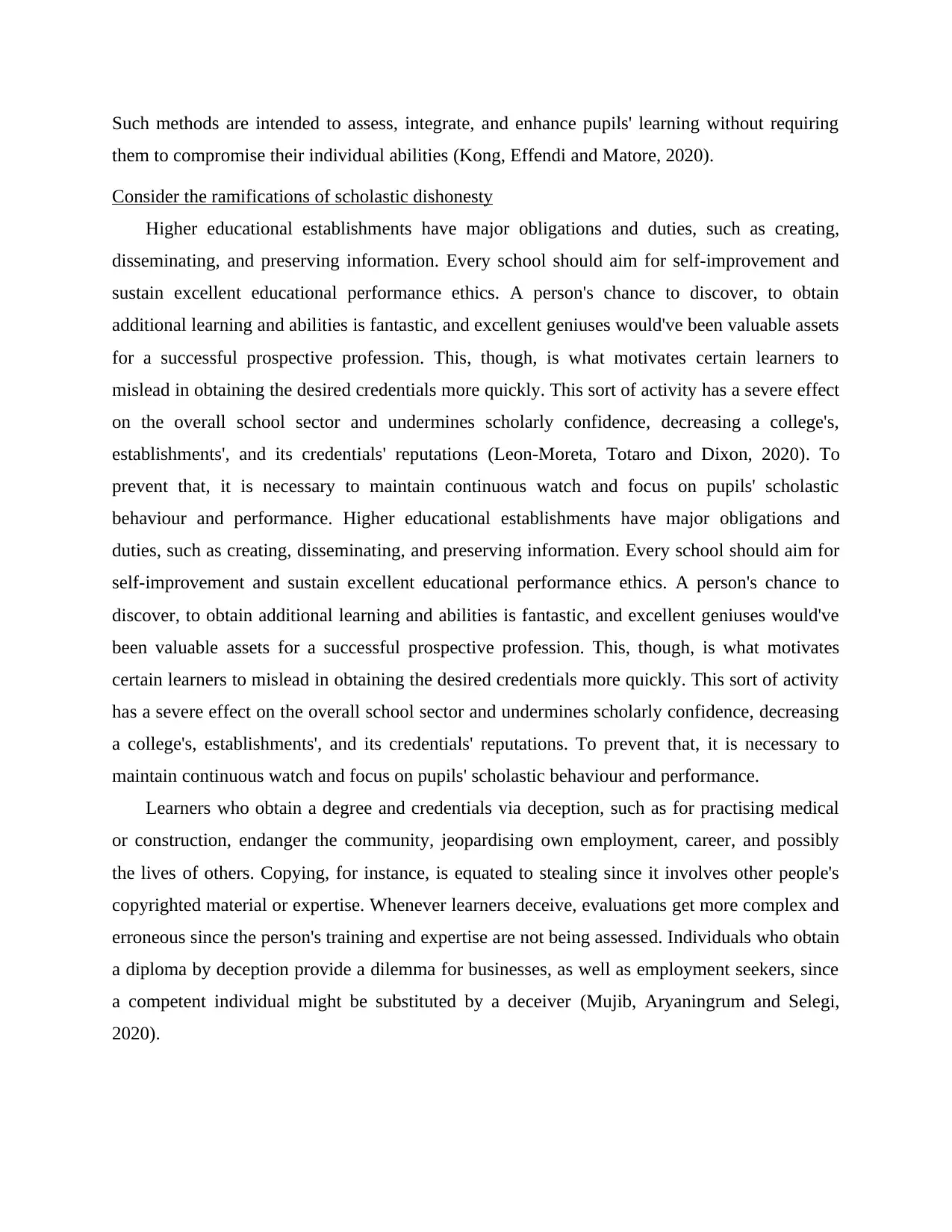
Such methods are intended to assess, integrate, and enhance pupils' learning without requiring
them to compromise their individual abilities (Kong, Effendi and Matore, 2020).
Consider the ramifications of scholastic dishonesty
Higher educational establishments have major obligations and duties, such as creating,
disseminating, and preserving information. Every school should aim for self-improvement and
sustain excellent educational performance ethics. A person's chance to discover, to obtain
additional learning and abilities is fantastic, and excellent geniuses would've been valuable assets
for a successful prospective profession. This, though, is what motivates certain learners to
mislead in obtaining the desired credentials more quickly. This sort of activity has a severe effect
on the overall school sector and undermines scholarly confidence, decreasing a college's,
establishments', and its credentials' reputations (Leon-Moreta, Totaro and Dixon, 2020). To
prevent that, it is necessary to maintain continuous watch and focus on pupils' scholastic
behaviour and performance. Higher educational establishments have major obligations and
duties, such as creating, disseminating, and preserving information. Every school should aim for
self-improvement and sustain excellent educational performance ethics. A person's chance to
discover, to obtain additional learning and abilities is fantastic, and excellent geniuses would've
been valuable assets for a successful prospective profession. This, though, is what motivates
certain learners to mislead in obtaining the desired credentials more quickly. This sort of activity
has a severe effect on the overall school sector and undermines scholarly confidence, decreasing
a college's, establishments', and its credentials' reputations. To prevent that, it is necessary to
maintain continuous watch and focus on pupils' scholastic behaviour and performance.
Learners who obtain a degree and credentials via deception, such as for practising medical
or construction, endanger the community, jeopardising own employment, career, and possibly
the lives of others. Copying, for instance, is equated to stealing since it involves other people's
copyrighted material or expertise. Whenever learners deceive, evaluations get more complex and
erroneous since the person's training and expertise are not being assessed. Individuals who obtain
a diploma by deception provide a dilemma for businesses, as well as employment seekers, since
a competent individual might be substituted by a deceiver (Mujib, Aryaningrum and Selegi,
2020).
them to compromise their individual abilities (Kong, Effendi and Matore, 2020).
Consider the ramifications of scholastic dishonesty
Higher educational establishments have major obligations and duties, such as creating,
disseminating, and preserving information. Every school should aim for self-improvement and
sustain excellent educational performance ethics. A person's chance to discover, to obtain
additional learning and abilities is fantastic, and excellent geniuses would've been valuable assets
for a successful prospective profession. This, though, is what motivates certain learners to
mislead in obtaining the desired credentials more quickly. This sort of activity has a severe effect
on the overall school sector and undermines scholarly confidence, decreasing a college's,
establishments', and its credentials' reputations (Leon-Moreta, Totaro and Dixon, 2020). To
prevent that, it is necessary to maintain continuous watch and focus on pupils' scholastic
behaviour and performance. Higher educational establishments have major obligations and
duties, such as creating, disseminating, and preserving information. Every school should aim for
self-improvement and sustain excellent educational performance ethics. A person's chance to
discover, to obtain additional learning and abilities is fantastic, and excellent geniuses would've
been valuable assets for a successful prospective profession. This, though, is what motivates
certain learners to mislead in obtaining the desired credentials more quickly. This sort of activity
has a severe effect on the overall school sector and undermines scholarly confidence, decreasing
a college's, establishments', and its credentials' reputations. To prevent that, it is necessary to
maintain continuous watch and focus on pupils' scholastic behaviour and performance.
Learners who obtain a degree and credentials via deception, such as for practising medical
or construction, endanger the community, jeopardising own employment, career, and possibly
the lives of others. Copying, for instance, is equated to stealing since it involves other people's
copyrighted material or expertise. Whenever learners deceive, evaluations get more complex and
erroneous since the person's training and expertise are not being assessed. Individuals who obtain
a diploma by deception provide a dilemma for businesses, as well as employment seekers, since
a competent individual might be substituted by a deceiver (Mujib, Aryaningrum and Selegi,
2020).
⊘ This is a preview!⊘
Do you want full access?
Subscribe today to unlock all pages.

Trusted by 1+ million students worldwide
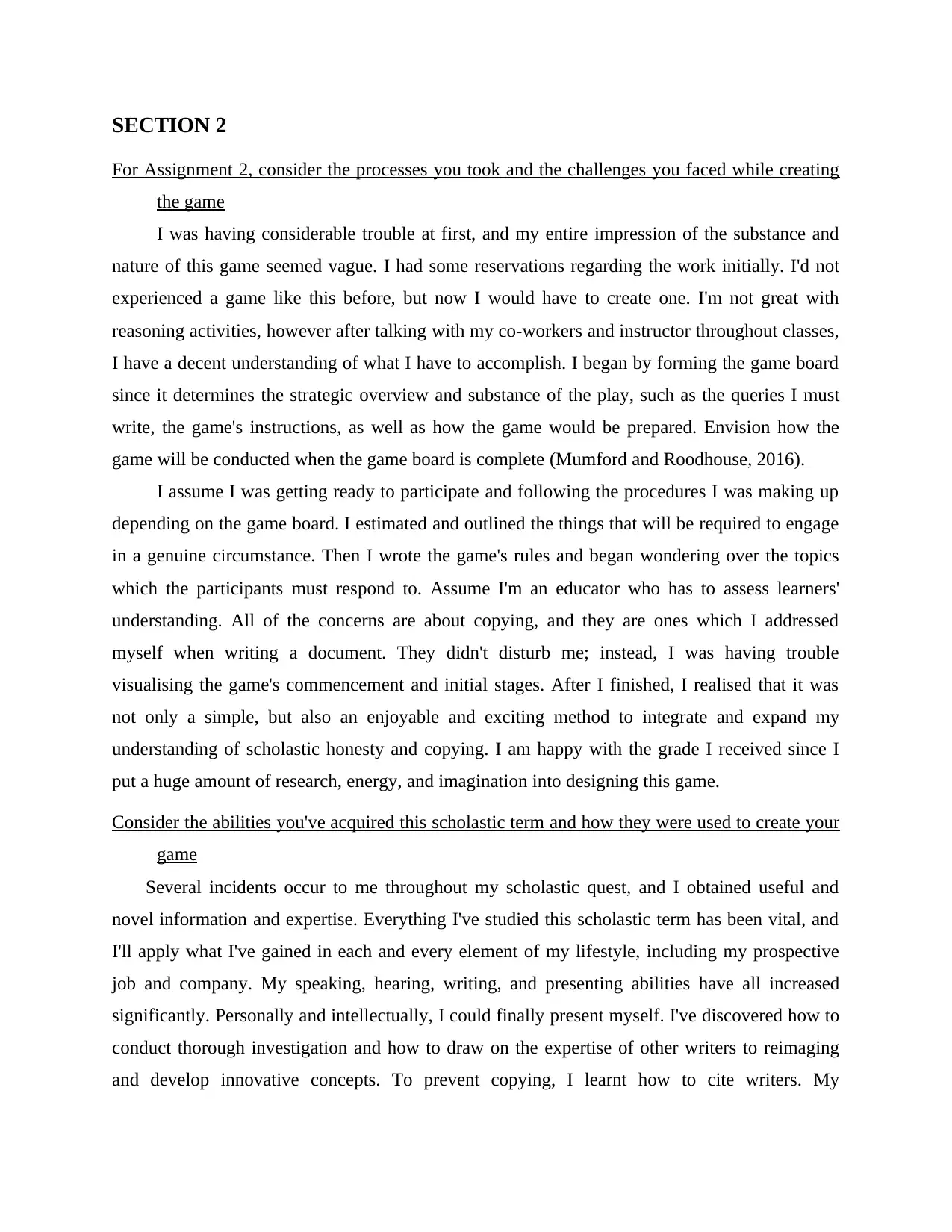
SECTION 2
For Assignment 2, consider the processes you took and the challenges you faced while creating
the game
I was having considerable trouble at first, and my entire impression of the substance and
nature of this game seemed vague. I had some reservations regarding the work initially. I'd not
experienced a game like this before, but now I would have to create one. I'm not great with
reasoning activities, however after talking with my co-workers and instructor throughout classes,
I have a decent understanding of what I have to accomplish. I began by forming the game board
since it determines the strategic overview and substance of the play, such as the queries I must
write, the game's instructions, as well as how the game would be prepared. Envision how the
game will be conducted when the game board is complete (Mumford and Roodhouse, 2016).
I assume I was getting ready to participate and following the procedures I was making up
depending on the game board. I estimated and outlined the things that will be required to engage
in a genuine circumstance. Then I wrote the game's rules and began wondering over the topics
which the participants must respond to. Assume I'm an educator who has to assess learners'
understanding. All of the concerns are about copying, and they are ones which I addressed
myself when writing a document. They didn't disturb me; instead, I was having trouble
visualising the game's commencement and initial stages. After I finished, I realised that it was
not only a simple, but also an enjoyable and exciting method to integrate and expand my
understanding of scholastic honesty and copying. I am happy with the grade I received since I
put a huge amount of research, energy, and imagination into designing this game.
Consider the abilities you've acquired this scholastic term and how they were used to create your
game
Several incidents occur to me throughout my scholastic quest, and I obtained useful and
novel information and expertise. Everything I've studied this scholastic term has been vital, and
I'll apply what I've gained in each and every element of my lifestyle, including my prospective
job and company. My speaking, hearing, writing, and presenting abilities have all increased
significantly. Personally and intellectually, I could finally present myself. I've discovered how to
conduct thorough investigation and how to draw on the expertise of other writers to reimaging
and develop innovative concepts. To prevent copying, I learnt how to cite writers. My
For Assignment 2, consider the processes you took and the challenges you faced while creating
the game
I was having considerable trouble at first, and my entire impression of the substance and
nature of this game seemed vague. I had some reservations regarding the work initially. I'd not
experienced a game like this before, but now I would have to create one. I'm not great with
reasoning activities, however after talking with my co-workers and instructor throughout classes,
I have a decent understanding of what I have to accomplish. I began by forming the game board
since it determines the strategic overview and substance of the play, such as the queries I must
write, the game's instructions, as well as how the game would be prepared. Envision how the
game will be conducted when the game board is complete (Mumford and Roodhouse, 2016).
I assume I was getting ready to participate and following the procedures I was making up
depending on the game board. I estimated and outlined the things that will be required to engage
in a genuine circumstance. Then I wrote the game's rules and began wondering over the topics
which the participants must respond to. Assume I'm an educator who has to assess learners'
understanding. All of the concerns are about copying, and they are ones which I addressed
myself when writing a document. They didn't disturb me; instead, I was having trouble
visualising the game's commencement and initial stages. After I finished, I realised that it was
not only a simple, but also an enjoyable and exciting method to integrate and expand my
understanding of scholastic honesty and copying. I am happy with the grade I received since I
put a huge amount of research, energy, and imagination into designing this game.
Consider the abilities you've acquired this scholastic term and how they were used to create your
game
Several incidents occur to me throughout my scholastic quest, and I obtained useful and
novel information and expertise. Everything I've studied this scholastic term has been vital, and
I'll apply what I've gained in each and every element of my lifestyle, including my prospective
job and company. My speaking, hearing, writing, and presenting abilities have all increased
significantly. Personally and intellectually, I could finally present myself. I've discovered how to
conduct thorough investigation and how to draw on the expertise of other writers to reimaging
and develop innovative concepts. To prevent copying, I learnt how to cite writers. My
Paraphrase This Document
Need a fresh take? Get an instant paraphrase of this document with our AI Paraphraser
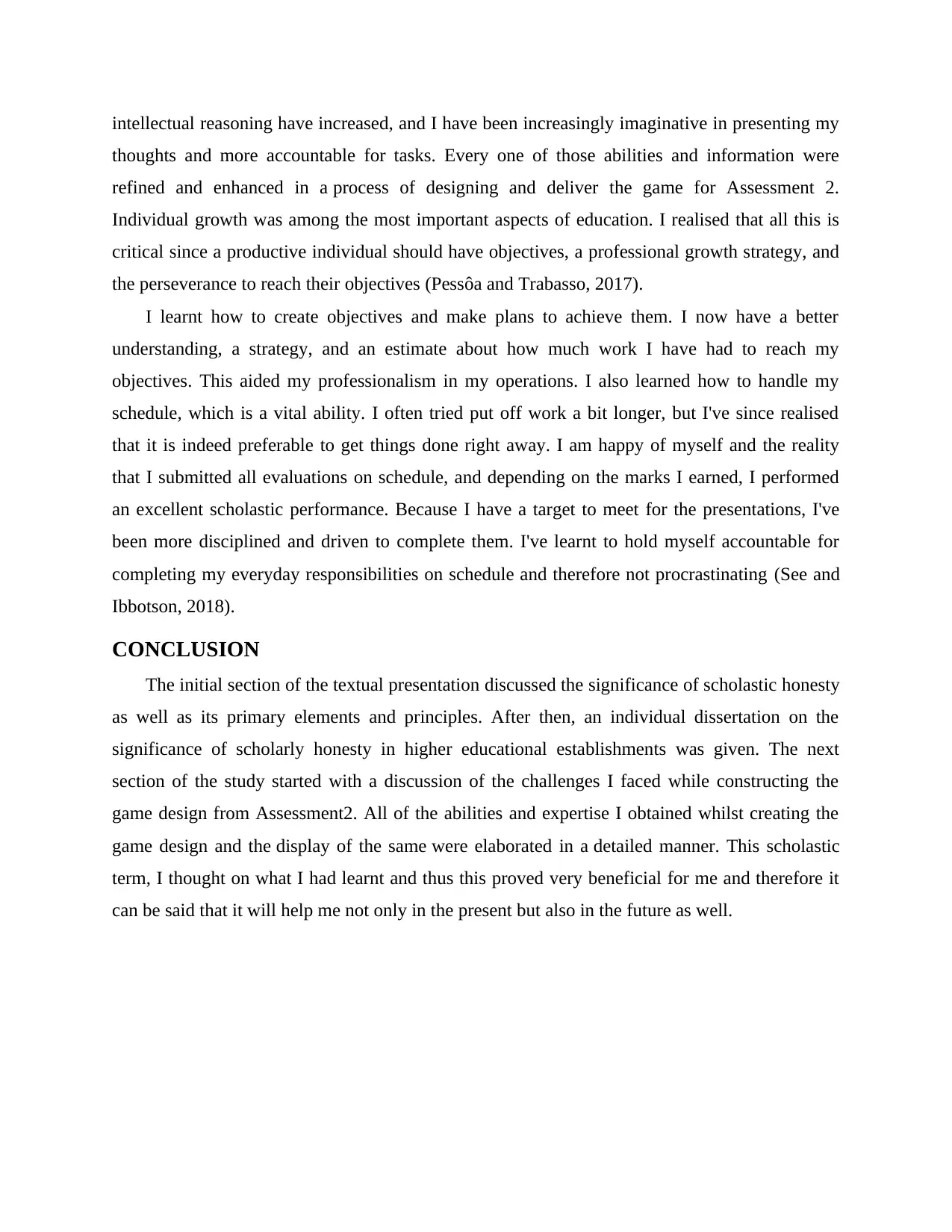
intellectual reasoning have increased, and I have been increasingly imaginative in presenting my
thoughts and more accountable for tasks. Every one of those abilities and information were
refined and enhanced in a process of designing and deliver the game for Assessment 2.
Individual growth was among the most important aspects of education. I realised that all this is
critical since a productive individual should have objectives, a professional growth strategy, and
the perseverance to reach their objectives (Pessôa and Trabasso, 2017).
I learnt how to create objectives and make plans to achieve them. I now have a better
understanding, a strategy, and an estimate about how much work I have had to reach my
objectives. This aided my professionalism in my operations. I also learned how to handle my
schedule, which is a vital ability. I often tried put off work a bit longer, but I've since realised
that it is indeed preferable to get things done right away. I am happy of myself and the reality
that I submitted all evaluations on schedule, and depending on the marks I earned, I performed
an excellent scholastic performance. Because I have a target to meet for the presentations, I've
been more disciplined and driven to complete them. I've learnt to hold myself accountable for
completing my everyday responsibilities on schedule and therefore not procrastinating (See and
Ibbotson, 2018).
CONCLUSION
The initial section of the textual presentation discussed the significance of scholastic honesty
as well as its primary elements and principles. After then, an individual dissertation on the
significance of scholarly honesty in higher educational establishments was given. The next
section of the study started with a discussion of the challenges I faced while constructing the
game design from Assessment2. All of the abilities and expertise I obtained whilst creating the
game design and the display of the same were elaborated in a detailed manner. This scholastic
term, I thought on what I had learnt and thus this proved very beneficial for me and therefore it
can be said that it will help me not only in the present but also in the future as well.
thoughts and more accountable for tasks. Every one of those abilities and information were
refined and enhanced in a process of designing and deliver the game for Assessment 2.
Individual growth was among the most important aspects of education. I realised that all this is
critical since a productive individual should have objectives, a professional growth strategy, and
the perseverance to reach their objectives (Pessôa and Trabasso, 2017).
I learnt how to create objectives and make plans to achieve them. I now have a better
understanding, a strategy, and an estimate about how much work I have had to reach my
objectives. This aided my professionalism in my operations. I also learned how to handle my
schedule, which is a vital ability. I often tried put off work a bit longer, but I've since realised
that it is indeed preferable to get things done right away. I am happy of myself and the reality
that I submitted all evaluations on schedule, and depending on the marks I earned, I performed
an excellent scholastic performance. Because I have a target to meet for the presentations, I've
been more disciplined and driven to complete them. I've learnt to hold myself accountable for
completing my everyday responsibilities on schedule and therefore not procrastinating (See and
Ibbotson, 2018).
CONCLUSION
The initial section of the textual presentation discussed the significance of scholastic honesty
as well as its primary elements and principles. After then, an individual dissertation on the
significance of scholarly honesty in higher educational establishments was given. The next
section of the study started with a discussion of the challenges I faced while constructing the
game design from Assessment2. All of the abilities and expertise I obtained whilst creating the
game design and the display of the same were elaborated in a detailed manner. This scholastic
term, I thought on what I had learnt and thus this proved very beneficial for me and therefore it
can be said that it will help me not only in the present but also in the future as well.
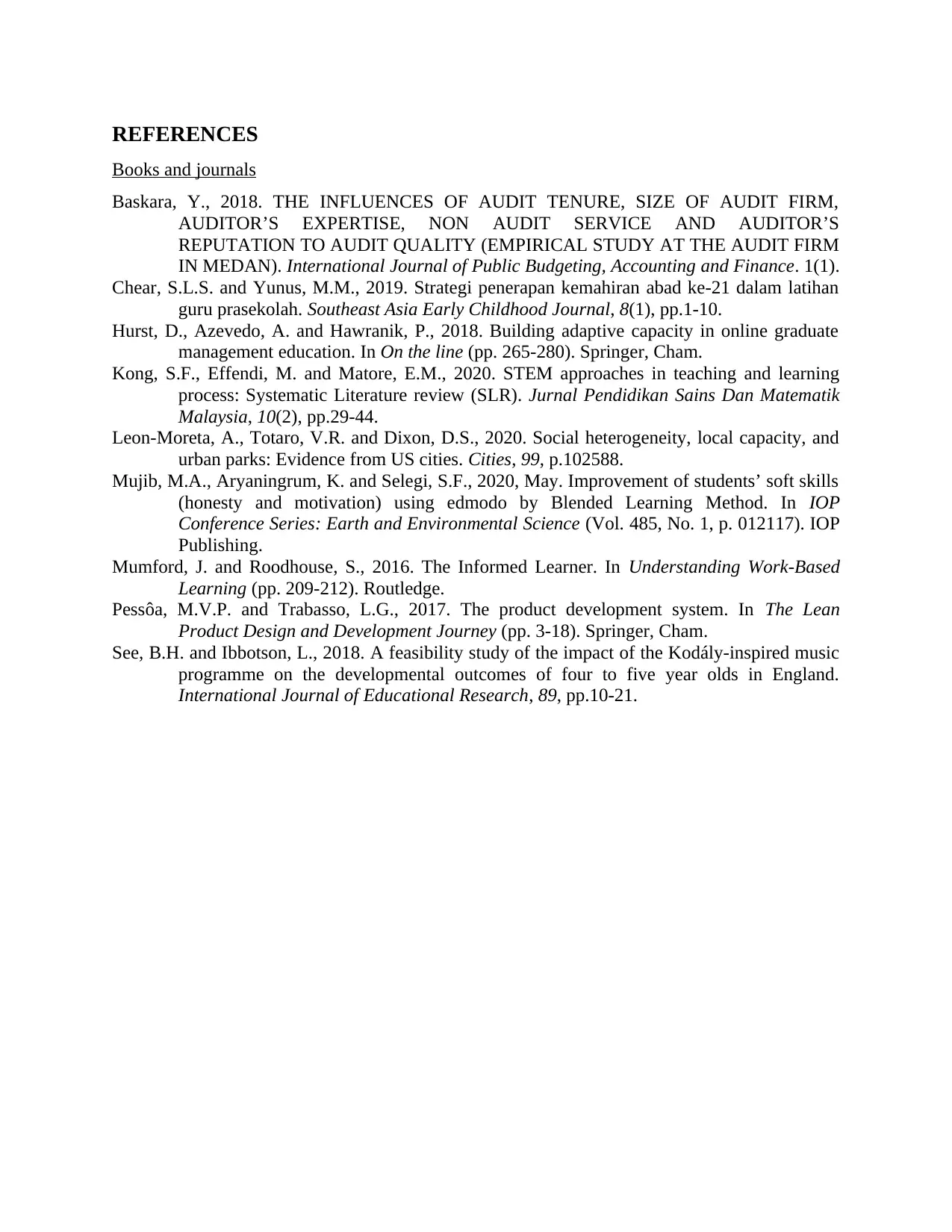
REFERENCES
Books and journals
Baskara, Y., 2018. THE INFLUENCES OF AUDIT TENURE, SIZE OF AUDIT FIRM,
AUDITOR’S EXPERTISE, NON AUDIT SERVICE AND AUDITOR’S
REPUTATION TO AUDIT QUALITY (EMPIRICAL STUDY AT THE AUDIT FIRM
IN MEDAN). International Journal of Public Budgeting, Accounting and Finance. 1(1).
Chear, S.L.S. and Yunus, M.M., 2019. Strategi penerapan kemahiran abad ke-21 dalam latihan
guru prasekolah. Southeast Asia Early Childhood Journal, 8(1), pp.1-10.
Hurst, D., Azevedo, A. and Hawranik, P., 2018. Building adaptive capacity in online graduate
management education. In On the line (pp. 265-280). Springer, Cham.
Kong, S.F., Effendi, M. and Matore, E.M., 2020. STEM approaches in teaching and learning
process: Systematic Literature review (SLR). Jurnal Pendidikan Sains Dan Matematik
Malaysia, 10(2), pp.29-44.
Leon-Moreta, A., Totaro, V.R. and Dixon, D.S., 2020. Social heterogeneity, local capacity, and
urban parks: Evidence from US cities. Cities, 99, p.102588.
Mujib, M.A., Aryaningrum, K. and Selegi, S.F., 2020, May. Improvement of students’ soft skills
(honesty and motivation) using edmodo by Blended Learning Method. In IOP
Conference Series: Earth and Environmental Science (Vol. 485, No. 1, p. 012117). IOP
Publishing.
Mumford, J. and Roodhouse, S., 2016. The Informed Learner. In Understanding Work-Based
Learning (pp. 209-212). Routledge.
Pessôa, M.V.P. and Trabasso, L.G., 2017. The product development system. In The Lean
Product Design and Development Journey (pp. 3-18). Springer, Cham.
See, B.H. and Ibbotson, L., 2018. A feasibility study of the impact of the Kodály-inspired music
programme on the developmental outcomes of four to five year olds in England.
International Journal of Educational Research, 89, pp.10-21.
Books and journals
Baskara, Y., 2018. THE INFLUENCES OF AUDIT TENURE, SIZE OF AUDIT FIRM,
AUDITOR’S EXPERTISE, NON AUDIT SERVICE AND AUDITOR’S
REPUTATION TO AUDIT QUALITY (EMPIRICAL STUDY AT THE AUDIT FIRM
IN MEDAN). International Journal of Public Budgeting, Accounting and Finance. 1(1).
Chear, S.L.S. and Yunus, M.M., 2019. Strategi penerapan kemahiran abad ke-21 dalam latihan
guru prasekolah. Southeast Asia Early Childhood Journal, 8(1), pp.1-10.
Hurst, D., Azevedo, A. and Hawranik, P., 2018. Building adaptive capacity in online graduate
management education. In On the line (pp. 265-280). Springer, Cham.
Kong, S.F., Effendi, M. and Matore, E.M., 2020. STEM approaches in teaching and learning
process: Systematic Literature review (SLR). Jurnal Pendidikan Sains Dan Matematik
Malaysia, 10(2), pp.29-44.
Leon-Moreta, A., Totaro, V.R. and Dixon, D.S., 2020. Social heterogeneity, local capacity, and
urban parks: Evidence from US cities. Cities, 99, p.102588.
Mujib, M.A., Aryaningrum, K. and Selegi, S.F., 2020, May. Improvement of students’ soft skills
(honesty and motivation) using edmodo by Blended Learning Method. In IOP
Conference Series: Earth and Environmental Science (Vol. 485, No. 1, p. 012117). IOP
Publishing.
Mumford, J. and Roodhouse, S., 2016. The Informed Learner. In Understanding Work-Based
Learning (pp. 209-212). Routledge.
Pessôa, M.V.P. and Trabasso, L.G., 2017. The product development system. In The Lean
Product Design and Development Journey (pp. 3-18). Springer, Cham.
See, B.H. and Ibbotson, L., 2018. A feasibility study of the impact of the Kodály-inspired music
programme on the developmental outcomes of four to five year olds in England.
International Journal of Educational Research, 89, pp.10-21.
⊘ This is a preview!⊘
Do you want full access?
Subscribe today to unlock all pages.

Trusted by 1+ million students worldwide
1 out of 9
Related Documents
Your All-in-One AI-Powered Toolkit for Academic Success.
+13062052269
info@desklib.com
Available 24*7 on WhatsApp / Email
![[object Object]](/_next/static/media/star-bottom.7253800d.svg)
Unlock your academic potential
Copyright © 2020–2026 A2Z Services. All Rights Reserved. Developed and managed by ZUCOL.


